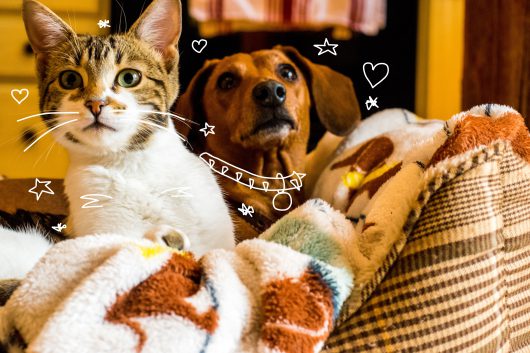Fireworks: How to help your pet cope
Increasingly popular at celebrations, fireworks can be very traumatic for our pets. For some pets the loud sudden noises, bright colours and flashing lights are scary but the fear can be eased with some home remedies. For other pets the fear of fireworks is a sign of true noise phobia.
How to help at home
Some simple changes around the house can help reduce stress for both dogs and cats. Dogs should be walked before dark so they’re home before any fireworks start, and cats should be kept in the house. Make sure identity tags and microchip details are up to date so that if pets do run off they’re able to be reunited with you. When fireworks do start try and act as normally as possible. Keep curtains drawn to block flashes of light and play the television or radio to cover some of the noise.
Both dogs and cat may appreciate a den to hide in. A dog crate is ideal; cover with a thick blanket containing a comfy bed and one or two favourite toys. Make sure outdoor cats are provided with a litter tray when kept inside overnight.

Can medication help?
Canine and feline pheromone products (such as Adaptil and Feliway) can help relax your pet in strange or stressful situations. They’re available as a spray (great for around a den) or a plug-in diffuser. They’re best used for a few days before fireworks start and can help to encourage your pet to relax.
Natural remedies are also available which can be given by mouth. These contain natural ingredients which can exert a calming effect. Like pheromone treatments they should be started a few days prior to the stressful event. Your vet can recommend a product, or they can be purchased online.
In some circumstances sedatives can be administered for firework phobias. These are only available via prescription from a vet who has examined your dog. Heavy sedatives such as diazepam will cause pets to be sleepy, but often don’t reduce awareness. This can ultimately make phobias worse, so are really only advisable for patients at high risk of self-injury. Lighter sedatives have more recently become commercially available; your vet will be happy to advise on the best products for your pet.
What if your pet’s noise phobia is severe?
Fear of loud noises can be specific to fireworks, but for some dogs will extend to fear of gun shots, crow scarers and some traffic noise. Those truly affected animals are at serious risk of self-injury during periods of fireworks, alongside potentially severe mental stress. Noise phobias are often deep rooted and can be difficult and time consuming to resolve. The majority are treatable but with patience and hard work.
The most appropriate way to attempt treatment at home is by purchasing a noise desensitization CD. These are recordings of loud sounds such as fireworks. They should be played during daylight hours while the dog is relaxed, starting at a volume barely audible to human ears. Once the dog is paying no attention, the volume should be gradually increased until the dog is tolerating a high volume.
If desensitization using a recording is not progressing, you should consult the advice of a specialist veterinary behaviourist. They will assess your individual circumstances and work with you to help. Your vet can put you in touch with a recommended professional in your area.
It’s always worthwhile having a pet insurance policy in place. For example, you could get help with advertising & reward should your pet go missing due to being worried about fireworks.
You might also be interested in…
Get a quote in minutes…

Existing customers
Call now on 0808 164 7999
to discuss your policy with us.
Monday - Friday: 08:00 - 20:00 Saturday: 09:00 - 14:00





 Back
Back
